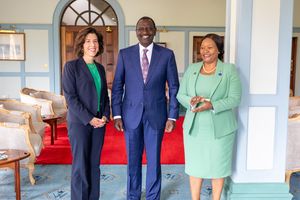
President William Ruto signs the Appropriations Bill into law at State House, Nairobi on June 28, 2024.
Out of Sh100 that you pay to the Kenya Revenue Authority, Sh70 goes into servicing debt. This is according to the budget outturn numbers for the month of May 2024 that were recently published by the National Treasury.
The Zoom revolution has left government teetering towards both a financial paralysis and a political stalemate. The debt service situation is the biggest elephant in the room.
As long as we continue to pay 70 per cent of revenues in debt service, and considering that we have other massive fixed costs such public service wages and subventions to county governments, the spending cuts that President William Ruto was touting this week as the appropriate response to the collapse of the Finance Bill will not work.
What options are open to Ruto? I don’t know. But I have had conversations with some fairly informed pundits who are suggesting the we must now consider negotiating a domestic debt exchange deal with domestic bondholders.
As we are all aware, by far the largest part of our debts are held by domestic bondholders, mainly commercial banks, insurance companies and pension funds.
The circumstances reminded me about that clever bond switch tactic that was effected by the former governor of the Central Bank of Kenya Dr Patrick Njoroge, in July 2012, when he offered investors high interest rates for longer tenors.
I think it was a clever survival tactic because rating agencies did not declare a debt default action on the part of Kenya the way they did with Ghana’s famous domestic debt exchange deal of December 2022.
Still, whether a debt exchange deal is feasible in our current circumstances remains an open ended question. If this option is chosen, it seems to me that a discussion around haircuts with domestic bondholders may be unavoidable.
Debt service cost
How do you deal with international investors? How do you address the issue of comparability of treatment? Clearly, no easy solutions.
Yet whichever way you look at it, the debt service cost issue is the biggest albatross around President Ruto’s administration’s neck. To survive, we will have to bring the figure of debt service to revenues down by a big percentage.
Complicating matters even further is the fact that even after the Finance Bill had fallen, President Ruto still went ahead and signed the Appropriations Bill that provides for a spending programme of Sh4 trillion this financial year.
Where are we going to borrow Sh1 trillion from and what are the implications to the cost of debt service?
The moment the Financial Bill died, the President should have returned this financial year’s Appropriations Bill to Parliament. For the truth of the matter is that the numbers don’t add up.
How is the situation evolving on the political front? Even more worrisome is what is beginning to look like an evolving political stalemate.
Two weeks since the Gen Zs came like thieves in the night to disrupt the political order, an unexpected stalemate has descended on the land.
And there is no quick fix in sight with the uprising swinging unpredictably between new outbursts of anger from below and threats of repression from above.
Indeed, the striking thing about the Gen Z uprising is the fact that what began as a campaign against the Finance Bill has morphed into a contest over the political legitimacy of the incumbent regime.
Economic health of the country
Either way, the contest must now go to the negotiating table. Who will lead the negotiations? The Faiths lost their credibility to play honest brokers in such circumstances.
Does it surprise that the 100-man multi-sectoral committee proposed by President Ruto to steer negotiations has been dismissed as a red herring to buy time, divert attention, and suck the oxygen from the rioting mobs?
As a society, we have yet to develop a clear distinction between partisan and non-partisan political activity. Yet negotiations remain the only way in the current circumstances because we must not allow either side to mortgage the long term economic health of the country.
Yes, the Gen Z have no leaders to represent them at the negotiating table. What is needed is a high profile and credible process cleverly designed to send very strong signals to the public that the regime is genuinely seeking a radical break with the past.
The Gen Z side has to come to terms with the historical truism that no ruling class ever gives power voluntarily.
On his part, President Ruto must now accept that holding constrained political power in a recovering country is far much better than holding absolute power in a regime whose popularity has dwindled precipitously since the general elections.
What I regret is that as long as the stalemate persists, creditors, foreigners, including the IMF will become stronger players here and demand more unworkable reforms. It’s a vicious circle.







